#ERP software implementation
Explore tagged Tumblr posts
Text
How to Discover the ROI of ERP Implementation Projects?
Determining the return on investment (ROI) of an enterprise resource planning (ERP) system involves a process of analyzing the expected benefits against the costs of implementing and operating the system.
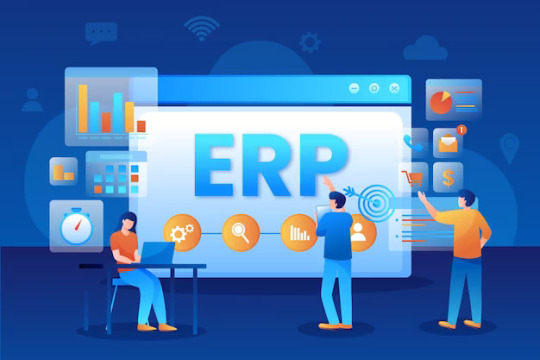
How to Calculate ROI of ERP Project?
Calculating the return on investment (ROI) for an enterprise resource planning (ERP) system involves comparing the expected benefits of the ERP implementation against its total cost.
Here are the steps to calculate ERP ROI:
Determine the total cost of the ERP implementation, including software licenses, hardware, consulting fees, employee training costs, and any other associated expenses.
Identify the expected benefits of the ERP implementation, such as increased efficiency, improved decision-making capabilities, reduced costs, increased productivity, and improved customer satisfaction.
Assign a monetary value to each expected benefit. For example, if the expected benefit is increased efficiency, calculate the potential cost savings associated with reducing manual efforts and eliminating duplicate data entry.
Estimate the time it will take to achieve each benefit and calculate the annual benefit for each benefit category.
Calculate the total expected annual benefit by adding up the annual benefits for each benefit category.
Subtract the total cost of the ERP implementation from the total expected annual benefit to get the total net benefit.
Divide the total net benefit by the total cost of the ERP implementation and multiply the result by 100 to get the ERP ROI percentage.
For example, if the total cost of the ERP implementation is $500,000 and the total expected annual benefit is $750,000, the total net benefit would be $250,000 ($750,000 - $500,000). The ERP ROI would be 50% ($250,000/$500,000 x 100). This means that for every dollar invested in the ERP system, the organization can expect to receive a return of 50 cents. It is important to note that the ROI calculation should take into account both short-term and long-term benefits and costs to get a comprehensive view of the ROI.
Determine the ROI of an ERP system
Here are the steps to determine the ROI of an ERP system:
Define the goals of the ERP system: Start by defining the goals of the ERP system, such as reducing operating costs, improving productivity, or enhancing customer service.
Identify the costs of the ERP system: Determine the total cost of the ERP system, including software licensing, hardware, consulting fees, employee training, and any other associated expenses.
Quantify the benefits of the ERP system: Identify the potential benefits of the ERP system, such as reduced operating costs, improved productivity, and increased revenue. Assign a monetary value to each benefit based on the potential financial impact on the organization.
Estimate the time to achieve benefits: Determine the time it will take to achieve each benefit and calculate the annual benefit for each benefit category.
Calculate the total expected annual benefit: Add up the annual benefits for each benefit category to get the total expected annual benefit.
Calculate the net present value (NPV) of the ERP system: Calculate the present value of the expected benefits minus the present value of the expected costs, using a discounted cash flow (DCF) analysis.
Calculate the ROI: Divide the NPV by the total cost of the ERP system and multiply by 100 to get the ROI percentage.
Conclusion:
ERP implementation can help you in many ways but without the calculation of Return on investment then you spend is totally lost. So make sure you have a good volume of return before investing in the ERP implementation. If you are planning to ERP implementation definitely you will conclude with the best oracle ERP cloud implementation, choose the service who has a year of expertise in oracle ERP implementation and the relevant field.
#erp implementation#erpcloud#erp software#erp implementation service#best erp implementation service#oraclecloudinfrastructure#oraclecloud#oracle implementation#erp modules#ERP software implementation
2 notes
·
View notes
Link
PMTrack ERP is the ERP software services provider for various industries. The ERP software provides a complete Project Management as well as Inventory Management solution for your business
#ERP implementation#ERP software Implementation#ERP system#ERP software for Manufacturing Industry#ERP for Manufacturer#Best ERP software#ERP software#Manufacturing ERP software#ERP software services provider
0 notes
Text
Why Engineering Companies Need Standard ERP Solutions for Successful Implementation
In today’s fast-paced manufacturing industry, the need to streamline operations, improve efficiency, and ensure growth is paramount. Businesses, especially in the engineering and manufacturing sectors, are turning to ERP software to manage their operations effectively. Enterprise Resource Planning (ERP) software is a game-changer for manufacturers looking to grow faster by integrating their processes and providing a comprehensive solution for resource management, decision-making, and scalability. If you are a manufacturer in India or a growing business in Bhopal, partnering with the right ERP software company in Bhopal could be the key to unlocking your potential. This blog explores the benefits of ERP software for manufacturers, the role of local ERP software providers in Bhopal, and why adopting ERP solutions is essential for success in today’s competitive landscape.
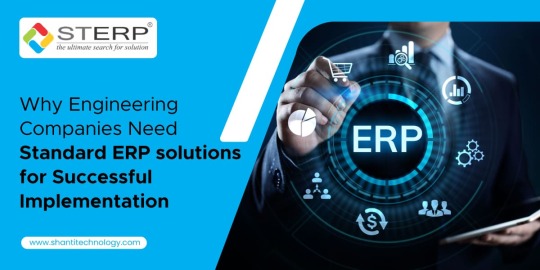
What Is ERP Software and Why Does It Matter?
ERP software is an integrated system that unifies core business processes such as procurement, inventory management, production planning, finance, and customer relationship management (CRM) into a centralized platform. This ensures seamless communication between departments, minimizes errors, and optimizes resource usage. For manufacturers, manufacturing enterprise resource planning solutions offer specific functionalities to address production scheduling, supply chain management, and quality control. These features are critical for scaling operations and improving overall business performance.
Benefits of ERP Software for Manufacturers
1. Centralized Operations
Manufacturers handle a wide range of tasks daily, from raw material procurement to final product delivery. ERP software integrates all these processes into a single platform, eliminating silos and ensuring real-time communication. Leading ERP software providers in Bhopal specialize in offering solutions tailored to manufacturing needs, ensuring smoother operations.
2. Enhanced Decision-Making
ERP systems provide accurate, real-time data through intuitive dashboards and analytics tools. This enables business leaders to make informed decisions, whether it is about production schedules, resource allocation, or financial forecasting. Engineering firms, in particular, can benefit from ERP software for engineering companies in India, which offers insights specific to their project-oriented workflows.
3. Optimized Resource Utilization
Effective resource management is critical in manufacturing. ERP software helps monitor and allocate raw materials, workforce, and equipment efficiently, reducing waste and ensuring optimal use of resources. By partnering with an engineering ERP software company in Bhopal, businesses can access customized solutions that cater to their unique requirements.
4. Improved Productivity
Automation of routine tasks, such as inventory tracking and order processing, frees up employees to focus on more strategic activities. This boost in productivity is a significant reason why manufacturers using ERP software for engineering companies experience faster growth.
5. Scalability
As manufacturing businesses grow, their operational needs become more complex. ERP systems are designed to scale with the organization, supporting additional locations, products, and services. Local ERP software companies in Bhopal provide scalable solutions that align with the growth trajectories of businesses in the region.
Why Bhopal Manufacturers Should Choose Local ERP Providers
Bhopal’s manufacturing and engineering sectors are thriving, thanks to its strategic location and growing industrial base. Local businesses stand to gain significantly by adopting ERP systems offered by experienced ERP software providers in Bhopal.
1. Tailored Solutions
Local providers understand the specific challenges faced by manufacturers in Bhopal and can customize solutions to meet their needs. For example, ERP software companies in Bhopal may offer modules tailored to local supply chains or compliance requirements.
2. On-the-Ground Support
Partnering with a local ERP software company in Bhopal ensures faster response times and personalized support during implementation and maintenance. This reduces downtime and ensures a smoother transition.
3. Cost-Effectiveness
Local ERP providers offer cost-effective solutions by eliminating the need for long-distance travel or remote troubleshooting. Businesses in Bhopal can enjoy world-class services without breaking the bank.
ERP Software for Engineering Companies in India
Engineering companies often deal with project-based operations requiring precise planning, tracking, and execution. ERP software for engineering companies in India is designed to address these needs, offering features like project management, resource scheduling, and cost tracking.
In Bhopal, collaborating with an engineering ERP software company in Bhopal ensures that local engineering firms have access to specialized solutions. These tools not only enhance operational efficiency but also improve project delivery timelines, leading to greater customer satisfaction.
ERP for Manufacturing Companies in India
India’s manufacturing sector is booming, driven by government initiatives and growing demand. To stay competitive, businesses must invest in advanced tools like ERP for manufacturing companies in India. These systems help manufacturers streamline production, manage supply chains, and maintain quality standards.
For manufacturers in Bhopal, adopting ERP software in Bhopal is a strategic move to keep pace with industry leaders. Features like real-time inventory management, production scheduling, and demand forecasting ensure businesses can respond quickly to market changes.
Real-Life Benefits of ERP Implementation
Manufacturers who implement ERP systems report:
Reduced Costs: By optimizing processes, ERP systems lower operational costs.
Faster Delivery: Improved production planning leads to quicker order fulfillment.
Better Quality: Automated quality checks ensure products meet customer expectations.
Businesses in Bhopal that have partnered with ERP software companies in Bhopal have experienced significant improvements in productivity, customer satisfaction, and revenue growth.
How to Choose the Right ERP Software Company in Bhopal
Selecting the right ERP provider is critical for a successful implementation. Here is what manufacturers should look for in an ERP software company in Bhopal:
Industry Expertise: Choose providers specializing in ERP software for engineering companies or manufacturing sectors.
Customization: Ensure the solution aligns with your unique business processes.
Local Presence: A local provider offers faster support and a better understanding of regional requirements.
Scalability: Opt for a system that can grow with your business.
Conclusion
ERP software is no longer a luxury but a necessity for manufacturers aiming to grow faster and compete effectively. By integrating operations, improving resource management, and enhancing decision-making, ERP systems empower businesses to achieve their goals. For manufacturers in Bhopal, collaborating with a trusted ERP software company in Bhopal ensures tailored solutions, cost-effectiveness, and reliable support.
Whether you are part of the engineering sector or a manufacturing enterprise, investing in manufacturing enterprise resource planning solutions will position your business for success in today’s dynamic market. Do not wait—explore the benefits of ERP software in Bhopal today and take the first step toward sustainable growth.
#ERP for manufacturing company in India#ERP implementation company in India#Best ERP implementation agecny#STERP#ERP software for engineering companies#Manufacturing enterprise resource planning#Rajkot#Surat#Ahmedabad#Gujarat#Maharashtra#Mumbai#Pune#Bhopal#Indore#Madhya Pradesh#ERP software for engineering companies in India#ERP integration#cloud ERP#ERP India#small business#ERP implementation
3 notes
·
View notes
Text
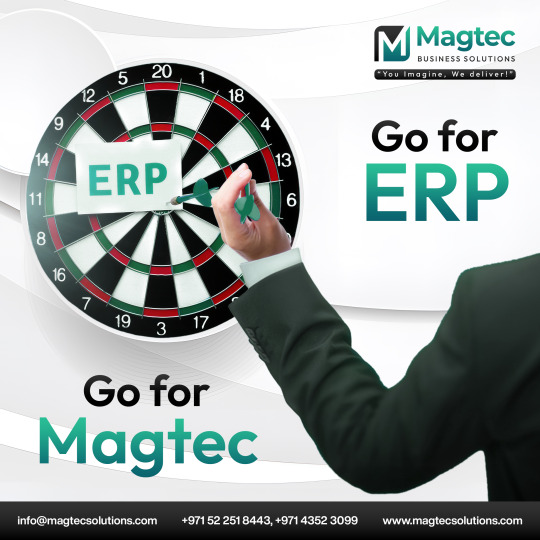
Hit the bullseye with the right ERP software! 🎯
Magtec Business Solutions helps you choose the perfect ERP solution to take your business to new heights.
Contact us today for a demo!
#erp#magtec#magtecsolutions#business#solutions#uae#software#technology#growth#success#innovation#digitaltransformation#cloud#enterprise#resources#planning#implementation#consulting#support#customization#integration#automation#efficiency#productivity#cost#savings
2 notes
·
View notes
Text
Best cloud ERP software in Saudi Arabia
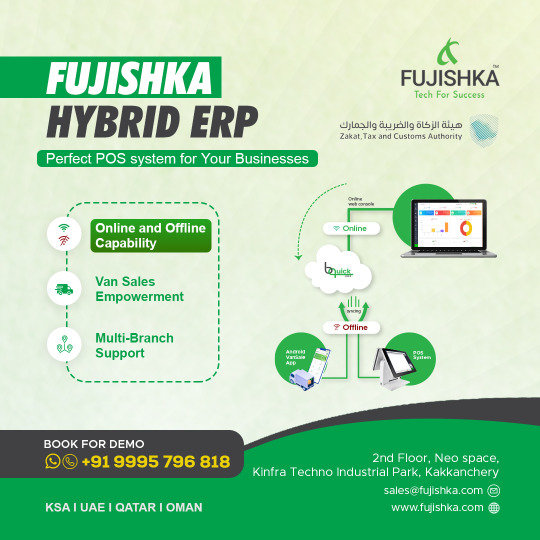
Best Cloud ERP in Saudi Arabia And Middle East
Fujishka Solutions is The best Hybrid ERP solutions
More Info: https://fujishka.com/
#erp systems#erp software uae#erp solution#erp implementation#ERP saudi arabia#saudi arabia#middle east#erp gcc
2 notes
·
View notes
Text
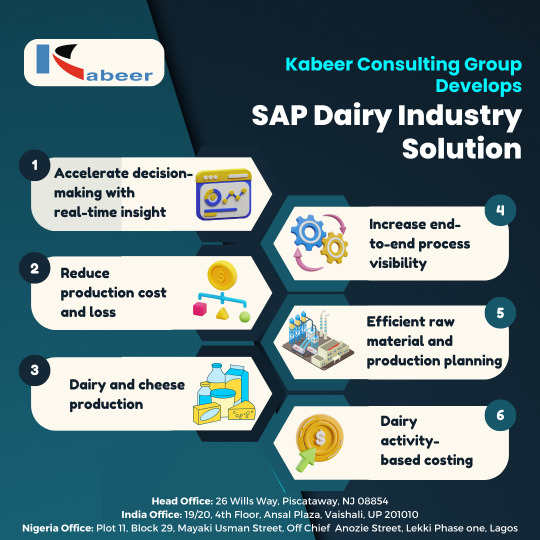
Kabeer_Dairy Industry Add-on for Milk industry!!! SAP B1 ERP Software not only increases efficiency but also helps to improve the quality of products of the Dairy and Milk Products Industry. To help to grow your business, Kabeer has developed an Add-on for the Milk Industry which can help your business to grow and make your organization more effective. Dairy Manufacturing Industries can effectively and efficiently handle every aspect of its business. Take your time to read about how Kabeer help in Dairy & Milk Products Industry.: https://www.kabeerconsulting.com/dairy-industry-solution/
Visit our company website: https://www.kabeerconsulting.com/
#milkindustry#sapbusinessone#dairyindustry#Kabeer#management#erp#implementation#erpsolutions#dairyproducts#milkproducts#manufacturing#business#sap#quality#software#SAPDairySolution#DairyManagementAddOn#SAPERPIntegration#SAPB1Partner#DairyIndustrySolution#DairySolutions#SAPImplementations#SAPAddOns#DairyERP#SAPIntegration
2 notes
·
View notes
Text
#odooimplementation#odoointegration#odoocustomization#erp implementation#odoo services#odoo#erp software solutions#odoodevelopment#erp solution#development#software#erpandcrmdevelopment
1 note
·
View note
Text
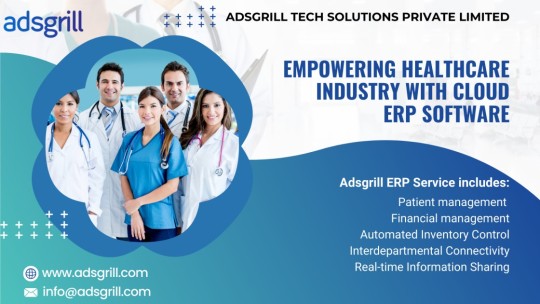
The healthcare industry plays an important role in society by offering people access to crucial medical services. These industries face several challenges that affect the healthcare industry’s capability to deliver cost-effective and efficient care. These problems, which range from regulatory difficulties to technological improvements, can have a significant impact on how healthcare is delivered and patient outcomes.
A good ERP solution unites all of the diverse parts of a complex healthcare organisation under a single roof. Each component is meant to work in tandem with the others, giving carers unrestricted access to all data across the organisation. Data can be shared across patient, pharmacy and clinician systems, as well as back-office administrative, personnel, and financial systems, allowing for better cost tracking and resource management.
#erp software#erp implementation#erp#healthcare#erp for small business#hospital erp software in saudi arabia
2 notes
·
View notes
Text
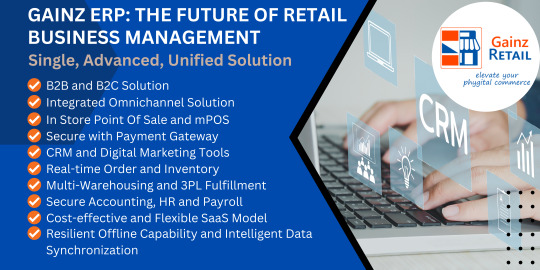
Gainz Retail ERP : The Future of Retail Business Management
We designed Gainz Retail ERP as an easy- to-use, retail business solution for in-store and online shopping.
Gainz Retail eliminates the hassle of maintaining multiple software for: POS - E-commerce - Accounting - Timesheet & Payroll
Let's show you how Gainz Retail ERP can manage your business with a single, advanced, unified solution.
for more details visit - https://www.odata.com/
#cloud erp#erp for small business#erp implementation#erp software#erpdevelopment#erpcompany#erp#erpsolutions#canada#sap erp#saas technology#saas application development#saascompany#saas software#saas app development company#retail pos software#retail store#retail business#retail erp software
2 notes
·
View notes
Text
Building an ERP System: A Comprehensive Step-by-Step Guide
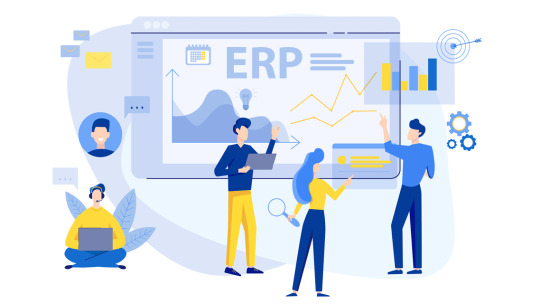
#application#development#software#software development#erpcloud#erp implementation#erp software#erp consultant#sap erp
2 notes
·
View notes
Text

The blog explains how Frolick transformed its operations by adopting a customized ERP functional consulting services from Contetra. Initially, Frolick faced challenges with inefficient manual processes and fragmented systems that slowed down productivity. By implementing a tailored ERP system, the company was able to integrate its disparate functions, automate routine tasks, and achieve real-time reporting. This transformation not only streamlined operations but also empowered Frolick with the insights needed for faster, data-driven decision-making. Ultimately, the ERP implementation paved the way for improved operational efficiency and set the stage for sustainable growth and scalability.
#erp implementation consultants#erp functional consultant#erp functional consulting services#erp selection consultants#erp software#erp system#erp implementation#erp integration#erp system implementation
0 notes
Text
#erp#erp software#erp system#erp implementation#erp solutions#cloud erp#erp integration#erpsolutions#erp for manufacturing#erp development company
0 notes
Link
A complete ERP system can be said only if there are all the steps are included including Planning, software capabilities analysis, Data management, Testing, Deploying, and system support. Without following these steps of implementation you cannot perfectly launch your software and it won’t work perfectly if you miss following any of the above steps.
ERP implementation,
#ERP solution#ERP system#ERP software#Best ERP software#ERP for Manufacturer#ERP software for Manufacturing Industry#ERP software Implementation#ERP implementation
0 notes
Text

Accelon Technologies is your trusted SAP Business One Partner in Delhi, helping businesses simplify operations, enhance efficiency, and drive growth. Our expert team specializes in SAP Business One implementation, customization, and support to ensure seamless integration with your business processes. Whether you need ERP consulting, data migration, or industry-specific solutions, we tailor SAP Business One to meet your unique needs. With real-time insights, automation, and streamlined workflows, we empower businesses to make informed decisions and stay competitive.
#SAP Business One#SAP Business One Partner#SAP Business One Delhi#ERP Software#Business Automation#SAP Partner Delhi#Accelon Technologies#ERP Consulting#Business Growth#Enterprise Solutions#SAP Implementation#Cloud ERP#Small Business ERP#SAP Customization#Digital Transformation
1 note
·
View note
Text
Odoo Implementation Services | ERP Implementation Company
Get expert Odoo implementation services from professional Odoo ERP implementation company to streamline your business process and improve efficiency.
0 notes
Text
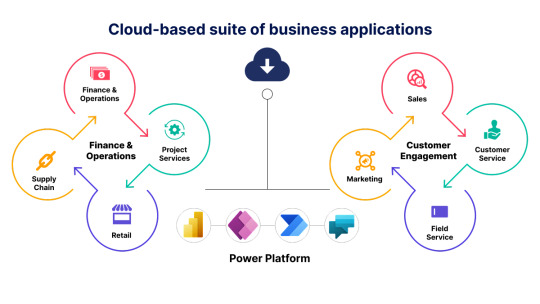
What is Dynamics 365 Implementation ? Dynamics 365 implementation refers to the process of setting up Microsoft’s cloud applications to improve an organization’s business functions. This includes customizing the system to fit specific business requirements, integrating it with existing systems, migrating data, and training users for effective system adoption. Successful implementation ensures that businesses can use Dynamics 365 to automate processes, gain deeper insights, and improve customer service.
#microsoft dynamics 365#dynamics 365 property management#microsoft dynamics 365 for real estate#cloud erp software#Dynamics 365 Implementation
0 notes